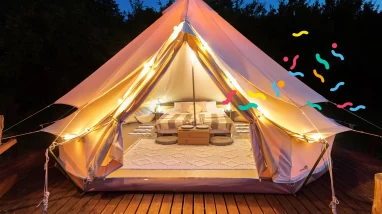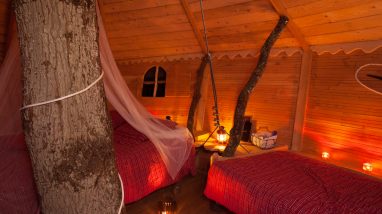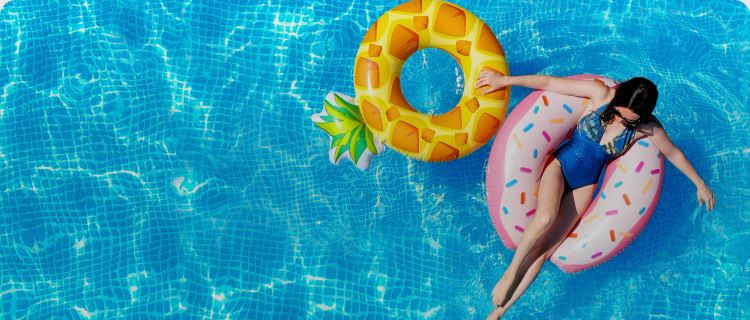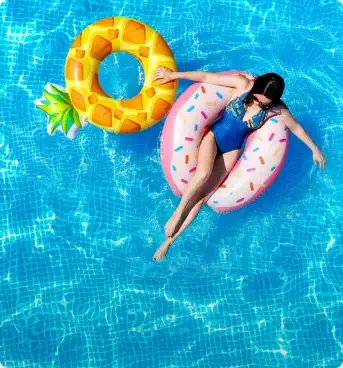Camping is a fantastic way to get close to nature and it’s even more enjoyable when you do it in an eco-friendly way. This means creating as little waste as possible on our holidays and not harming the environment while we’re enjoying it. Lots of campsites now offer eco-friendliness as an attractive reason to visit their properties and have real green credentials. Eco does not necessarily mean slumming it either – luxurious “eco-glamping” experiences exist! Green campsites can also bring you closer to nature than a more traditional campsite, often being designed to blend in with nature and allow us to camp among wildlife rather than excluding ourselves from it.
One of the great things about family eco camping is how easy and enjoyable it is to teach kids about the environment without them even realising they are learning. If children have a positive experience in nature while observing the environment and its importance to our lives then they will never want to live any other way. It’s also a really enjoyable way for families to reconnect again. Discovering how much fun there is in nature for families is a great bonding exercise and one that will live long in everyone’s memory. Read on to find out why we think eco camping is the way of the future.
Nature’s Choice
Eco-camping is a luxury wilderness experience.
Many eco camps are unique and beautiful. Because they choose to use only recyclable materials in their accommodation options, they build only with metal, wood and other materials that are eco-friendly. The best way to do that is to use traditional designs like yurts, teepees and domes to create eco-friendly villages that blend into the landscape. Eco-friendly camping is a return to the way we used to build housing – non-invasive, functional and one that works with the environment and not against it. So, while simple, these campsites seem sophisticated.
Comfort comes first in eco camping
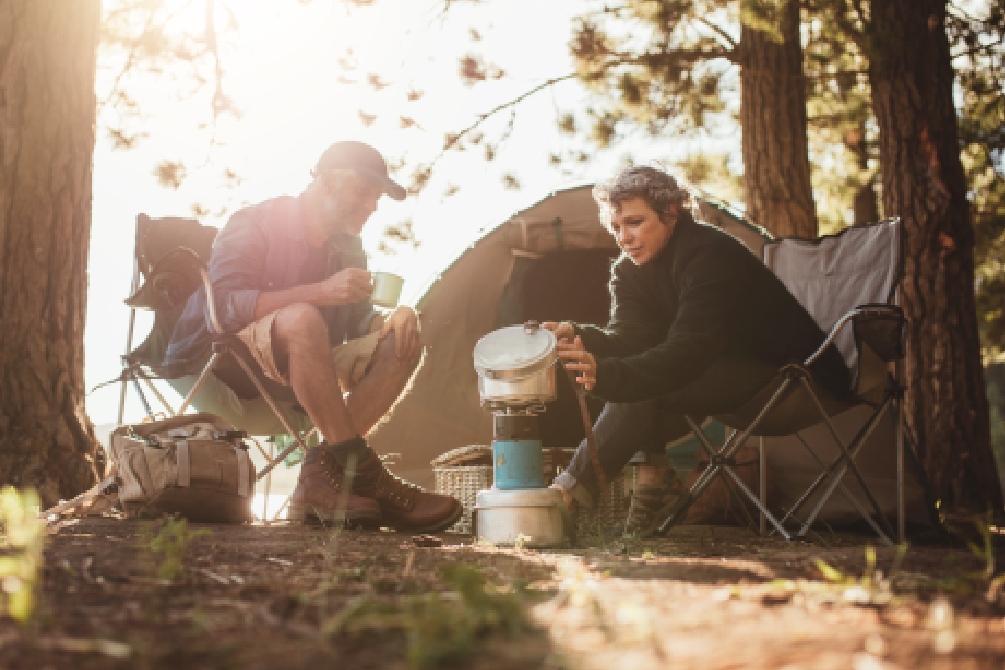
Many eco-friendly camps will offer double and single beds with full bedding and private compostable toilets to their guests. They also often come with wood-burning stoves and windows with views, so they can be used all year round. This makes them a much more comfortable and cosy experience than traditional non-eco camping.
You get to watch wildlife in its natural habitat
Eco-friendly campsites are all about getting out into the wild and enjoying it without damaging it. Consequently, they tend to be places that are rich in wildlife. As more and more species come under threat from industrialisation, now is the right time to try and see them in their natural habitat. Eco-camping is the perfect way to do this, bringing you up close and personal without costing the earth.
Green camping encourages us to reduce our water intake
Many eco campsites are designed to reduce waste water. They are set up to recycle but encourage you to be aware of how much water you are using too. A bucket shower is often found in French camps alongside regular shower facilities, giving a fun outdoor shower experience that allows you to control and be aware of the amount of water you use. Eco-campsites often have their own water treatment facilities too.
You’ll get to minimise your car use
Campsites that aim to be eco-friendly tend to be set up in areas that allow you to reduce your car use while on site. Wilderness walks are usually immediately available and amenities like pubs and cafes are often within walking distance. So, if you can’t get there by public transport then at least aim to park your car and only use it for necessary trips.
Children will learn how to work with nature, not against it
Spending a week in an eco-camp will probably teach your children more about the environment and how to protect it than years of schooling. Sleeping in eco-friendly accommodation, using composting toilets rather than chemical ones, thinking about their everyday water use and living in a natural habitat are life lessons that will stay with them forever.
The whole family will learn how little electricity you actually need
As eco campsites go off-grid and rely on solar power as a primary source, it gives you a chance to observe your electricity use. A cool box, for example, is a perfectly good way to keep food and dairy fresh for extended periods without running a fridge 24 hours a day. Our phones and devices churn through power when we don’t often need to be using them and most outdoor activities work just fine without added technology like trackers and fitness watches.
You’ll be encouraged to try eco-friendly soaps and shampoos
One of the hardest jobs in treating wastewater is removing the oils and chemicals we put in while showering. Why not try some eco-friendly soaps and shampoo bars to see the difference?
Get Active
Eco camping opens up a whole host of great outdoor activities that your family will love.
Go forest bathing
Forest “bathing” can be done in any natural habitat, not just in a forest. Simply identify a natural area, leave behind the technology and other distractions and “bathe” in the environment without any purpose other than to enjoy what’s around you.
Try wild swimming
Wild swimming is a hugely popular activity that simply involves finding a river or lake to plunge into. France is full of both, so it won’t be hard to find pristine rivers to swim in and a picnic by the riverbank will be unforgettable. Early summer is the best time for this activity, as the harsh heat and infrequent rain of August means many rivers, pools and lakes run dry, especially in the south of the country.
Kickstart a vegetarian lifestyle

While it’s not at all mandatory, vegetarian food is a lot more eco-friendly than meat or fish. Why not give it a go during your holiday? Make it a game to see how many flavourful meals you can invent using only plant-based ingredients.
Take up bird watching
Bird watching is a wonderful activity that leaves no trace and can be done anywhere. Once you have learned a little about it using a book or other resources, it’s hard to watch a bird without noticing patterns in its behaviour that are quite similar to our own.
Cut out paper and plastic
You don’t need to use disposable plates, cups or packaging while camping – try to stick to reusable items and – even better – those made from recyclable materials like bamboo, wood or enamel – and see if you can get through your holiday without creating any waste.
Quick Questions on Sustainable Camping
Curious about eco camping? Try our FAQs about how to camp sustainably and experience nature in a positive way.
What is eco camping?
Eco camping refers to camping with little or no impact on the environment. While some of the best examples are campsites that have been built from the ground up to have a very low carbon footprint, using only materials and power sources that are sustainable and recyclable, some existing campsites have also made big efforts to make their operations more environmentally friendly and we should all look out for them. For example, composting and solar-powered electricity are key features of eco-campsites.
Are eco-camps hard to find?
No. These days, green credentials are a real badge of pride that campsites like to advertise widely. More and more campsite operators in France and around the world are switching to eco-friendly approaches. Campsites that were previously mains electricity only are gradually switching to partial or complete solar power, and waste water treatment is becoming an important issue for many sites. The use of plastic is discouraged and the enforcement of recycling rules are widespread.
Why do people prefer eco-friendly campsites?
Camping in itself is an inherently eco-friendly activity. The people who enjoy it like to be in the countryside and experience nature first-hand. Anything that will protect that experience is going to be a valuable asset to campers, and so, there is a gradual move in France towards demanding more eco-friendly campsites. In general, campers don’t want to harm the environment and so properties that set out to protect it should be a natural choice.
Are eco-friendly campsites suitable for families?
Eco-friendly initiatives are almost always family-friendly too. They are about reconnecting with people and nature and recognising the power we all have to make a difference in the world. Achieving this while on holiday with your family is a great experience and will be new and fun for kids. Eco-friendly camps tend to be in wilder areas but it’s not always the case. It’s simply about practising camping in a way that doesn’t leave a footprint or have a cost for the environment.
Are eco-friendly campsites less comfortable than regular campsites?
Usually not. The operators of eco-friendly campsites have spent a lot of time problem-solving the camping experience from an environmental perspective and so they have usually also found ways to improve the experience overall. They use the very best technologies to create a camping experience that is as close to carbon neutral as is possible and this produces benefits for everyone.
Book your next camping trip at an eco-friendly campsite.
